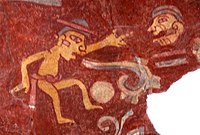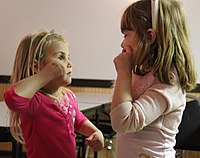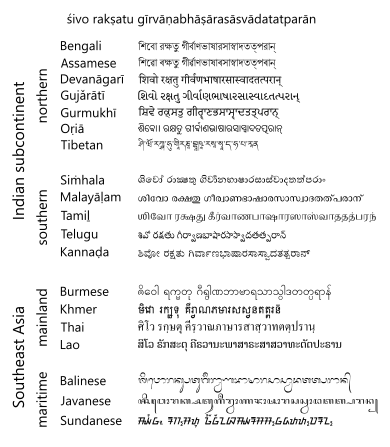Portal:Language
Introduction




Language is a structured system of communication that consists of grammar and vocabulary. It is the primary means by which humans convey meaning, both in spoken and signed forms, and may also be conveyed through writing. Human language is characterized by its cultural and historical diversity, with significant variations observed between cultures and across time. Human languages possess the properties of productivity and displacement, which enable the creation of an infinite number of sentences, and the ability to refer to objects, events, and ideas that are not immediately present in the discourse. The use of human language relies on social convention and is acquired through learning.
Estimates of the number of human languages in the world vary between 5,000 and 7,000. Precise estimates depend on an arbitrary distinction (dichotomy) established between languages and dialects. Natural languages are spoken, signed, or both; however, any language can be encoded into secondary media using auditory, visual, or tactile stimuli – for example, writing, whistling, signing, or braille. In other words, human language is modality-independent, but written or signed language is the way to inscribe or encode the natural human speech or gestures.
Depending on philosophical perspectives regarding the definition of language and meaning, when used as a general concept, "language" may refer to the cognitive ability to learn and use systems of complex communication, or to describe the set of rules that makes up these systems, or the set of utterances that can be produced from those rules. All languages rely on the process of semiosis to relate signs to particular meanings. Oral, manual and tactile languages contain a phonological system that governs how symbols are used to form sequences known as words or morphemes, and a syntactic system that governs how words and morphemes are combined to form phrases and utterances.
The scientific study of language is called linguistics. Critical examinations of languages, such as philosophy of language, the relationships between language and thought, how words represent experience, etc., have been debated at least since Gorgias and Plato in ancient Greek civilization. Thinkers such as Jean-Jacques Rousseau (1712–1778) have argued that language originated from emotions, while others like Immanuel Kant (1724–1804) have argued that languages originated from rational and logical thought. Twentieth century philosophers such as Ludwig Wittgenstein (1889–1951) argued that philosophy is really the study of language itself. Major figures in contemporary linguistics include Ferdinand de Saussure and Noam Chomsky. (Full article...)
Selected language -
Pidgin Delaware (also Delaware Jargon or Trader's Jargon) was a pidgin language that developed between speakers of Unami Delaware and Dutch traders and settlers on the Delaware River in the 1620s. The fur trade in the Middle Atlantic region led Europeans to interact with local native groups, and hence provided an impetus for the development of Pidgin Delaware. The Dutch were active in the fur trade beginning early in the seventeenth century, establishing trading posts in New Netherland, the name for the Dutch territory of the Middle Atlantic and exchanging trade goods for furs.
Pidgin languages characteristically arise from interactions between speakers of two or more languages who are not bilingual in the other group's language. Pidgin languages typically have greatly simplified syntax, a limited vocabulary, and are not learned as a first language by its speakers. Words typically have very general meanings but do not carry more than one meaning concept, and do not have the type of structural complexity commonly found in many languages. (Full article...)
Did you know (auto-generated)

- ... that in 1944, the Tuvan-language journal Lenin–Stalinnьꞑ tugunuꞑ adaa-pile switched from the Latin script to the Cyrillic script?
- ... that although three witnesses are typically needed in linguistic reconstruction, only two are necessary if borrowing and innovation can be ruled out?
- ... that the Greco-Australian dialect, a variety of Modern Greek, blends words with English roots into the Greek language?
- ... that the fieldwork of Soviet ethnologist Evdokia Kozhevnikova for her unfinished dissertation provides a valuable record of the culture and the language of the Georgian province of Svaneti?
- ... that Eritrean poet Yirgalem Fisseha Mebrahtu was imprisoned for six years without trial, and later published poems in Tigrinya based on her experience?
- ... that while Philippine Spanish has been described as an endangered language, a new generation of speakers has emerged?
More did you know -
- ...that the totem pole (pictured) which welcomes visitors to the British Museum was documented for the museum by Rev. John Henry Keen years before it was purchased?
- ...that Missouri French is a nearly extinct dialect of French that developed in what is now the midwestern United States during the colonial period?
- ...that Hindi, Bengali, and Portuguese were all proposed as official languages of the United Nations?
- ...that the Vedda language is a Creole based on Sinhalese of Sri Lanka instead of a dialect?
Categories
Linguistics: Computational linguistics • Grammar • Historical linguistics • Morphology • Phonetics • Phonology • Pragmatics • Reading • Semantics • Sociolinguistics • Syntax • Writing
Languages: Language families • Pidgins and creoles • Sign languages
Linguists: By nationality • Historical linguists • Morphologists • Phoneticians • Phonologists • Sociolinguists • Syntacticians • Translators
Stubs: Constructed languages • Languages • Linguists • Pidgins and creoles • Typography • Vocabulary and usage • Writing systems
Full Language category tree
|
|---|
|
Select [►] to view subcategories
|
Related portals
Selected topic -
This article discusses the phonological system of standard Russian based on the Moscow dialect (unless otherwise noted). For an overview of dialects in the Russian language, see Russian dialects. Most descriptions of Russian describe it as having five vowel phonemes, though there is some dispute over whether a sixth vowel, /ɨ/, is separate from /i/. Russian has 34 consonants, which can be divided into two types:
- hard (твёрдый [ˈtvʲordɨj]) or plain
- soft (мягкий [ˈmʲæxʲkʲɪj]) or palatalized
Russian also distinguishes hard consonants from soft consonants and from iotated consonants, making four sets in total: /C Cʲ Cj Cʲj/, although /Cj/ in native words appears only at morpheme boundaries (подъезд, podyezd, IPA: [pɐdˈjest] for example). Russian also preserves palatalized consonants that are followed by another consonant more often than other Slavic languages do. Like Polish, it has both hard postalveolars (/ʂ ʐ/) and soft ones (/tɕ ɕː/ and marginally or dialectically /ʑː/). (Full article...)
Selected picture -

Maryada Patral letter of conduct written by Acharya Bhiksu (first head of Jain Swetamber Terapanth sect) written in Rajasthani language
Language News
- 22 November 2024 – Censorship in Belarus
- In a speech at Minsk State Linguistic University, Belarusian President Alexander Lukashenko threatens to shut down the Internet in his country if there are mass protests before the upcoming presidential election after the previous election saw mass protests. (Rferl)
- 20 August 2024 – Germany–Iran relations
- Following the ordered closure of the Islamic Centre Hamburg in Hamburg, Germany, Iran orders the closure of two branches of a German language school in Tehran for "breaching Iranian law, committing various illegal actions and extensive financial violations." In response, Germany summons the Iranian ambassador. (DW)
- 19 July 2024 –
- Ukrainian linguist, nationalist politician, and former People's Deputy Iryna Farion is shot and killed in Lviv, Ukraine by an unknown assailant. (Reuters)
Topics

Languages of Africa: Arabic, Chadic, Cushitic, Kanuri, Maasai, Setswana, Swahili, Turkana, Xhosa, Yoruba, Zulu, more...
Languages of the Americas: Aleut, Carib, Cherokee, Inuktitut, Iroquois, Kootenai, Mayan, Nahuatl, Navajo, Quechuan, Salish, American Sign Language, more...
Languages of Asia: Arabic, Assamese, Balochi, Bengali, Chinese, Japanese, Hajong, Hebrew, Hindustani, Kannada, Kokborok, Marathi, Khasi, Korean, Kurdish, Malayalam, Manipuri, Meithei, Mongolian, Persian, Rajasthani, Sindhi, Sanskrit, Sylheti, Tamil, Tanchangya, Tulu, Telugu, Tibetan, Thai, Turkish, Vietnamese, Khowar, more...
Languages of Austronesia: Austric, Fijian, Hawaiian, Javanese, Malagasy, Malay, Maori, Marshallese, Samoan, Tahitian, Tagalog, Tongan, Auslan, more...
Languages of Europe: Basque, Czech, Danish, Dutch, English (book), French, German, Greek, Italian, Latin, Leonese, Norwegian, Polish, Portuguese, Romanian, Russian, Slovak, Spanish, Ukrainian more...
Constructed languages: Esperanto, Ido, Volapük, more...
Agglutinative language, Analytic language, Constructed language, Creole, Context-free language, Extinct language, Dialect, Fusional language, Inflectional language, International language, Isolating language, Language isolate, National language, Natural language, Pidgin, Pluricentric language, Polysynthetic language, Proto-language, Sign language, Spoken language, Synthetic language, Variety (linguistics)

Applied linguistics, Cognitive linguistics, Accent (dialect), Computational linguistics, Descriptive linguistics, Eurolinguistics, Generative linguistics, Historical linguistics, Lexicology, Lexical semantics, Morphology, Onomasiology, Phonetics, Phonology, Pragmatics, Prescription, Prototype semantics, Psycholinguistics, Semantics, Stylistics, Sociolinguistics, Syntax
See also: List of linguists

Alphabets: Arabic alphabet, Bengali alphabet, Cyrillic alphabet, Hebrew alphabet, Latin alphabet, more...
Other writing systems: Abjad, Abugida, Braille, Hieroglyphics, Logogram, Syllabary, SignWriting, more..
See also: History of the alphabet, Script
Associated Wikimedia
The following Wikimedia Foundation sister projects provide more on this subject:
-
Commons
Free media repository -
Wikibooks
Free textbooks and manuals -
Wikidata
Free knowledge base -
Wikinews
Free-content news -
Wikiquote
Collection of quotations -
Wikisource
Free-content library -
Wikiversity
Free learning tools -
Wiktionary
Dictionary and thesaurus
Find a language
| Enter an ISO 639 code to find the corresponding language article |





















